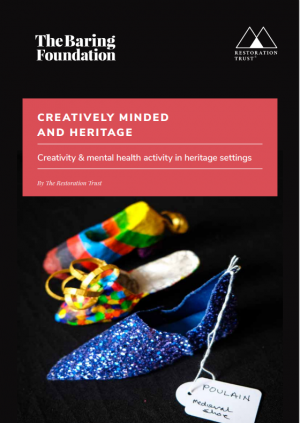We are publishing today a new report, Creatively Minded and Heritage, which provides an overview, through 18 case studies, or how heritage and arts organisations are drawing on a wide range of heritage assets and art forms to support people’s mental health and promote community connections.
This report has been produced by cultural therapy organisation, The Restoration Trust, and was commissioned by the Baring Foundation.
Creatively Minded and Heritage includes examples of organisations across the UK working with people with mental health problems in the fields of archaeology, local history, natural and historic environments and a particularly rich seam of work in archives, often working with people with experience of mental health problems to explore the stories of patients who were unable to tell their own.
Laura Drysdale, Director of the Restoration Trust says:
“Heritage brings such significant added value for creativity and mental health programmes that it should be a core resource for people looking for mental health treatments, and for heritage, creativity and mental health professionals developing cross-sectoral social prescribing programmes.
It makes sense to marry a mental health system where demand is overwhelming supply, with heritage assets where there is a plentiful supply.”
The report calls for:
- heritage organisations to ask themselves how they could use their places, people and collections to deliver more brilliant mental health and creativity projects
- heritage and creativity projects to be widely available as a mental health prescription and for heritage/creative providers to be paid
- universities to continue progress in collaboration and research that meets cross-sectoral needs; and
- funders and national organisations to fund flexibly, share best practice and urge others including the Government to see heritage as a mental health asset.
This is the latest in the Foundation’s Creatively Minded series which explores different areas of arts and mental health activity in the UK.
We will be holding a short launch for the report on 23 November at 3pm online. You can register here.
“I’d recommend it wholeheartedly, even if you’re only a little bit interested I mean in any sort of history, then yes. All I can focus on is, it’s just giving me back my imagination.” Dr Hill’s Casebook, a Restoration Trust project
“Why should the people who’ve never visited a land be that country’s prime historians? I think any mental health archive is incomplete until those who have been labelled ‘mad’ tell their side.” Dolly Sen, Artist and Activist, who has been working with the Wellcome Collection’s mental health archives.
“All those years of thinking about this place as a landscape I had to navigate my way through in fear, that was causing me harm, has now changed, I now see the beauty of the border landscapes, I am more at ease within myself.” Jim, a veteran with PTSD from serving during The Troubles in Northern Ireland who took part in Belfast Exposed’s therapeutic photography and archive project.
